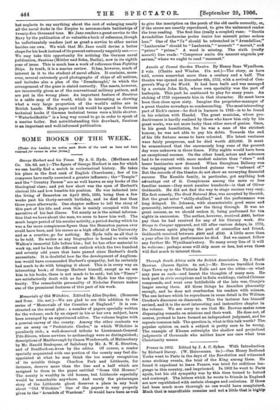Annals of Covent Garden Theatre. By Henry Saxe Wyndham. 2
vols. (Chatto and Windus. 21s. net.)—The story, as here told, covers somewhat more than a century and a half. The theatre was opened on December 6th, 1732, with a revival of Con- greve's Way of the World. It had been built and was managed by a certain John Rich, whose own speciality was the part of harlequin. This part be continued to play for many years. An etching of 1753 represents him in that character. He must have been then close upon sixty. Imagine the proprietor-manager of a great theatre nowadays so condescending. The most interesting part of Rich's career—he died in harness in 1762—is to be found in his relation with Handel. The great musician, whose pro- ductiveness is hardly realised by those who know him only by his great works, was not more lucky than other men of genius. Once, to his great humiliation, for he was a man of the strictest honour, he was not able to pay his debts. Towards the end of his life fortune seems to have relented. His latest ventures were fairly prosperous, and he died worth .t20,000. It must be remembered that the enormously long runs of the present day were unknown in those times. Fifty nights would have been. an exceptional success. On the other hand, actors and actresses had to be content with more modest salaries than " stars " and lesser luminaries now demand. When Georgiana Bellamy was the reigning actress six hundred guineas was "unheard of." But the records of the theatre do not show an unvarying financial success. The Kemble family, in particular, got anything but advantage out of it. Conspicuous among the more or less familiar names—they must number hundreds—is that of Oliver Goldsmith. He did not find the way to stage success very easy. His first comedy, The Good Natured Man, was accepted by Garrick.. But the great actor "shilly-shallied," and the performance waa long delayed. Dr. Johnson, with characteristic good sense and generosity, intervened, and saw the thing through. It was no great success, as we should reckon it, being performed for ten nights in succession. The author, however, received £400, better pay than he had received for any of his literary work. She Stoops to Conquer appeared, not till after various delays, in 1773, Dr. Johnson again playing the part of counsellor and friend.. Goldsmith received between £400 and .8500. A little more than. a year after its first performance he died. But we cannot follow any further Mr. Wyndham's story. To many every line of it will be welcome ; perhaps some will skip more or less, but even these will find much to interest them.










































 Previous page
Previous page